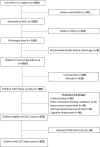Early factors associated with risk of developmental coordination disorder in very preterm children: A prospective area-based cohort study in Italy
- PMID: 35437802
- PMCID: PMC9546412
- DOI: 10.1111/ppe.12878
Early factors associated with risk of developmental coordination disorder in very preterm children: A prospective area-based cohort study in Italy
Abstract
Background: Developmental coordination disorder (DCD) is a motor disorder of unknown aetiology that may have long-term consequences on daily activities, and psychological and physical health. Studies investigating risk factors for DCD have so far provided inconsistent results.
Objectives: To assess, using a parent-report screening tool, risk of DCD in school-age very preterm children born in Italy, and investigate the associated early biomedical and sociodemographic factors.
Methods: A prospective area-based cohort (804 children, response rate 73.4%) was assessed at 8-11 years of age in three Italian regions. Perinatal data were abstracted from medical records. DCD risk was measured using the Italian-validated version of the Developmental Coordination Disorder Questionnaire (DCDQ-IT). For this study, children with cognitive deficit (i.e. intelligence quotient <70), cerebral palsy, severe vision and hearing disabilities, and other impairments affecting movement were excluded. A total of 629 children were analysed. We used inverse probability weighting to account for loss to follow-up, and multilevel, multivariable modified Poisson models to obtain adjusted risk ratio (aRR) and 95% confidence interval (CI). Missing values in the covariates were imputed.
Results: 195 children (weighted proportion 31.8%, 95% CI 28.2, 35.6) scored positive on the DCDQ-IT, corresponding to the 15th centile of the reference Movement-ABC test. Factors associated with overall DCD risk were male sex (aRR 1.35, 95% CI 1.05, 1.73), intrauterine growth restriction (aRR 1.45, 95% CI 1.14, 1.85), retinopathy of prematurity (aRR 1.62, 95% CI 1.07, 2.45), and older maternal age at delivery (aRR 1.39, 95% CI 1.09, 1.77). Complete maternal milk feeding at discharge from the neonatal unit and higher parental socio-economic status were associated with decreased risk.
Conclusions: Both biomedical and sociodemographic factors increase DCD risk. These findings can contribute to elucidating the origins of this disorder, and assist in the identification of children at risk for early referral and intervention.
Keywords: developmental coordination disorder; early diagnosis; risk factors; very preterm birth.
© 2022 The Authors. Paediatric and Perinatal Epidemiology published by John Wiley & Sons Ltd.
Similar articles
-
Risk of Developmental Coordination Disorder in Italian very preterm children at school age compared to general population controls.Eur J Paediatr Neurol. 2019 Mar;23(2):296-303. doi: 10.1016/j.ejpn.2019.01.002. Epub 2019 Jan 11. Eur J Paediatr Neurol. 2019. PMID: 30711366
-
Rates of Developmental Coordination Disorder in Children Born Very Preterm.J Pediatr. 2021 Apr;231:61-67.e2. doi: 10.1016/j.jpeds.2020.12.022. Epub 2020 Dec 17. J Pediatr. 2021. PMID: 33340547
-
Perinatal risk factors for developmental coordination disorder in children born extremely preterm.Acta Paediatr. 2023 Apr;112(4):675-685. doi: 10.1111/apa.16651. Epub 2023 Jan 12. Acta Paediatr. 2023. PMID: 36587369
-
Risk factors in early life for developmental coordination disorder: a scoping review.Dev Med Child Neurol. 2021 May;63(5):511-519. doi: 10.1111/dmcn.14781. Epub 2020 Dec 20. Dev Med Child Neurol. 2021. PMID: 33345317 Free PMC article.
-
Developmental Coordination Disorder and cerebral palsy: categories or a continuum?Hum Mov Sci. 2010 Oct;29(5):787-98. doi: 10.1016/j.humov.2010.04.006. Epub 2010 Jul 1. Hum Mov Sci. 2010. PMID: 20594606 Review.
Cited by
-
Causal Effects on Early Risk Factors of Developmental Coordination Disorder in the Dutch Lifelines Cohort.Acta Paediatr. 2025 Aug;114(8):1895-1903. doi: 10.1111/apa.70050. Epub 2025 Mar 3. Acta Paediatr. 2025. PMID: 40026278 Free PMC article.
-
[Recent research on the long-term neurodevelopmental outcomes of very preterm infants].Zhongguo Dang Dai Er Ke Za Zhi. 2023 Oct 15;25(10):1066-1071. doi: 10.7499/j.issn.1008-8830.2305072. Zhongguo Dang Dai Er Ke Za Zhi. 2023. PMID: 37905765 Free PMC article. Review. Chinese.
-
Risk factors for cerebral palsy and movement difficulties in 5-year-old children born extremely preterm.Pediatr Res. 2023 Aug;94(2):771-780. doi: 10.1038/s41390-022-02437-6. Epub 2023 Jan 24. Pediatr Res. 2023. PMID: 36694025
-
Evaluating the Efficacy of Gross-Motor-Based Interventions for Children with Developmental Coordination Disorder: A Systematic Review.J Clin Med. 2024 Aug 7;13(16):4609. doi: 10.3390/jcm13164609. J Clin Med. 2024. PMID: 39200751 Free PMC article. Review.
References
-
- American Psychiatric Association . Diagnostic and Statistical Manual of Mental Disorders (5th edition). American Psychiatric Association; 2013.
-
- Zwicker JG, Yoon SW, Mackay M, Petrie‐Thomas J, Rogers M, Synnes AR. Perinatal and neonatal predictors of developmental coordination disorder in very low birthweight children. Arch Dis Child. 2013;98:118‐122. - PubMed
-
- Faebo Larsen R, Hvas Mortensen L, Martinussen T, Nybo Andersen AM. Determinants of developmental coordination disorder in 7‐year‐old children: a study of children in the Danish National Birth Cohort. Dev Med Child Neurol. 2013;55:1016‐1022. - PubMed
-
- Caravale B, Herich L, Zoia S, et al. Risk of Developmental Coordination Disorder in Italian very preterm children at school age compared to general population controls. Eur J Paediatr Neurol. 2019;23:296‐303. - PubMed
Publication types
MeSH terms
LinkOut - more resources
Full Text Sources
Medical


